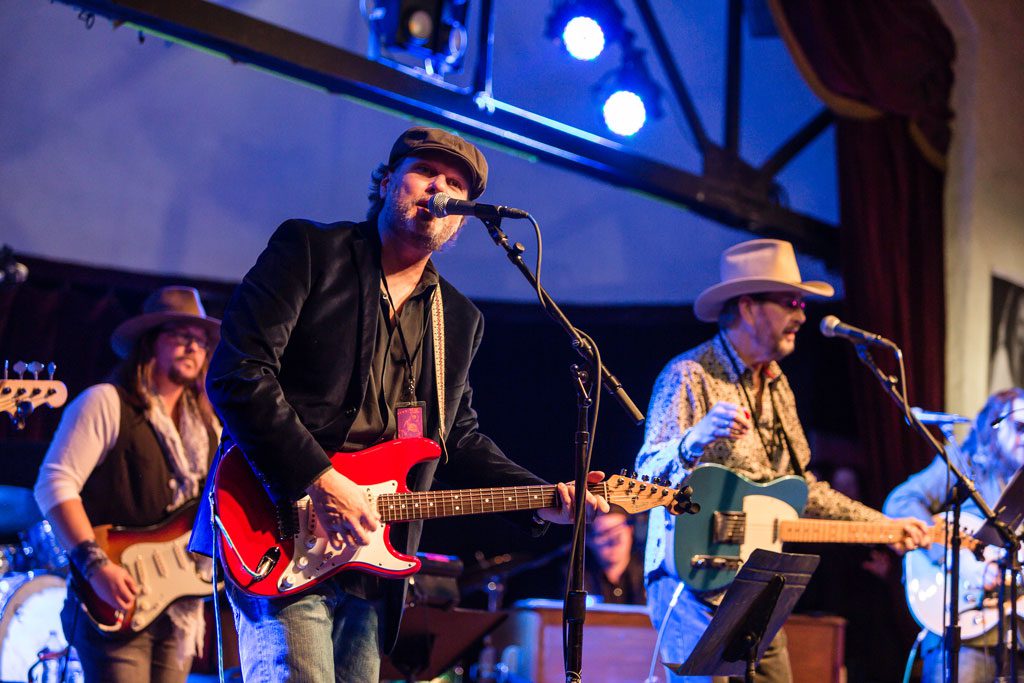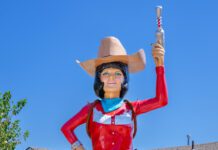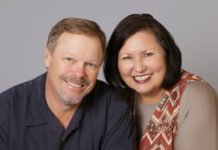
[dropcap]Exiting[/dropcap] the Cain’s Ballroom stage after he and a stellar ad hoc band had romped joyously through the old chestnut “Trouble in Mind,” Rodney Lay was beaming.
“Fun, fun,” he announced, to no one in particular.
I happened to be on hand as emcee, and away from the microphone I asked him how long he planned to keep doing the kind of thing he’d just done.
“John,” he said, “I’ll do it ’til the good Lord takes me home.”
He was there because the good Lord had recently taken home one of his contemporaries, the irreplaceable Leon Russell. And Lay was only one of dozens of performers who gathered at the venerable Tulsa landmark to honor with their own talents the famed Tulsan who had pursued his art until the very end, which came Nov. 13.
Lay, whose group Rodney and the Blazers was a contemporary of Russell’s earliest rock ’n’ roll bands, is 76, and he was far from the only septuagenarian to play his music for the packed house that night. The bill included Tulsa rock ’n’ roll pioneers Gene Crose, Bill Pair, Johnny Williams and Jimmy Markham, all deep into their 70s, and, like their old pal Leon, all veterans of the hardscrabble T-town music scene of the 1950s, of sock hops and frat parties and joints with shifty owners who often demanded the bands play five or six sets a night.
Markham, the harmonica player and vocalist who still performs regularly, organized the Dec. 15 tribute show, along with well-known area music figure Larry Shaeffer, the music promoter and former longtime owner of the Cain’s. Friends for years, the two attended Russell’s star-studded memorial service at ORU’s Mabee Center and came away convinced that they needed to put on a Tulsa-centric tribute concert, bringing together people who’d known Leon, who’d worked with Leon, who’d been deeply influenced by Leon. They knew they were casting their net wide. If there’s such a thing as the classic Tulsa Sound – and more about that later – then Leon was its axis, the hub around which it all spun.
By the time of the first rehearsal for what became known as A Tribute to Leon, a good three generations of talent either encouraged, nurtured or influenced by Russell had been engaged. These included, among others, the members of Leon’s final touring band: guitarist Beau Charron, drummer Brandon Holder, and Leon’s longtime bassist Jack Wessel, who first played with Russell at the Cain’s in 1981, along with others like bassist Paul Lee and guitarist Chris Simmons, members of Russell groups in years past.
Many of the participants were old enough to remember the 1969 Chess Records release Fathers and Sons, in which two old-guard stars of the Chicago blues style, Muddy Waters and Otis Spann, joined with new-generation players Michael Bloomfield, Paul Butterfield and Donald “Duck” Dunn. This aggregation was Fathers and Sons writ large and local. There were even real fathers and sons on hand, with Chebon Markham joining his father, Jimmy, at one point for a spirited “Blues Power” and Steve White working with Don, his dad, on a convincing performance of the Leon Russell-Don Preston composition, “Stranger in a Strange Land.”
But mostly, as in Fathers and Sons, the parentage was symbolic. That hardly made it any less genuine. The whole evening seemed to play to a single purpose, which was to give voice to the powerful impact Leon Russell had on our music and, by inference, on our lives. It was an event more than a show, oddly enough bringing to mind a quote from the old western-movie sidekick Smiley Burnette. In the ’60s, as a cast member of the TV series Petticoat Junction, he remarked to a journalist that the show was like a cake – you didn’t see the eggs.
That analogy doesn’t completely fit A Tribute to Leon. You couldn’t help but be impressed by the generations of stars on hand, from Crose to Wink Burcham, Markham to John Fullbright, Tommy Crook to Nathan Eicher (who opened the show together, foreshadowing the multi-generational performances to come), and Williams to Travis Fite, with the likes of Walt Richmond, Jamie Oldaker, David Teegarden, Jimmy Byfield, Charles Tuberville, Peter Mayo, and the Red Dirt Rangers in between. Clearly, they were all there for a much bigger reason than to shine a spotlight on themselves. (And they certainly weren’t in it for the money; nobody involved got a dime.) The show was staged, the cake was baked, as an offering to the powerful spirit who hovered over it.
Reflecting Leon and his legacy, the songs ranged through genres, from country to blues to piano ballads to straight-ahead rock. But as wonderful as the music was, the visuals may have told the story even better, often in little moments: Teegarden and Oldaker, who’ve collectively played on some of the biggest stages in the world, grinning knowingly at one another as their dual drumming powered Lay’s “Trouble in Mind.” Burcham bopping out wearing a top hat, a la Leon. Brian Lee, who toured with Russell for years, talking about how nervous he was to be doing Leon’s material, and then silencing the crowd with a powerful “Song for You,” just voice and piano. Bassist Gary Gilmore, who came to prominence in the ’70s, waltzing out on stage and plugging in like a major-league slugger casually approaching the on-deck circle.
There was so much more. Music director Paul Benjaman, talented and unflappable, good-naturedly adapting throughout the night – sometimes at the last minute – to changes in repertoire, and then playing guitar like he’d known that particular version of the song all his life. Richmond and Fullbright (the Grammy nominee who’d perform a wonderful set of Leon songs toward the end of the evening) on piano and organ, respectively, trading spontaneous licks as though they did the same thing every evening. Russell friend and collaborator Matt Harris attacking “Shootout at the Plantation” with zest and authority. Markham and the Legacy Horns – Williams on saxophone, Steve Ham on trombone, Mike Bennett on trumpet – roaring through several false endings before finally wrestling a sizzling “Got My Mojo Workin’” to the floor.
And then, the indelible picture of octogenarian superstar Roy Clark, stepping out from the back of the stage to wave at the wildly cheering crowd, and with that simple gesture giving the whole evening his imprimatur.
For more than three decades of my writing life, I’ve tried to pin down the elements of the classic Tulsa Sound. A definition has proved so elusive that I’ve sometimes wondered if there’s even such a thing. After all, the gospel, blues, R&B and country influences that colored Leon’s oeuvre don’t come out the same way in the deep-groove, laid-back tunes of J.J. Cale – or, for that matter, the soft rock of David Gates, another of Leon’s Tulsa contemporaries.
The more I’ve studied it, the more I’ve listened not only to our music but also to our people who made and continue to make it, I’ve come to understand that the Tulsa Sound is not so much a musical style as it is a brotherhood. It’s years of Tulsa musicians listening to and playing with one another, picking up licks and swapping songs, and while it didn’t start with Leon Russell, he was the one who stepped in and pushed it forward into the rock era. It continues to this day, an unbroken line.
I still can’t tell you exactly what the Tulsa Sound is. All I can tell you is that, like a living soul in a breathing body, on that stage, on that night – well, there it was.

























